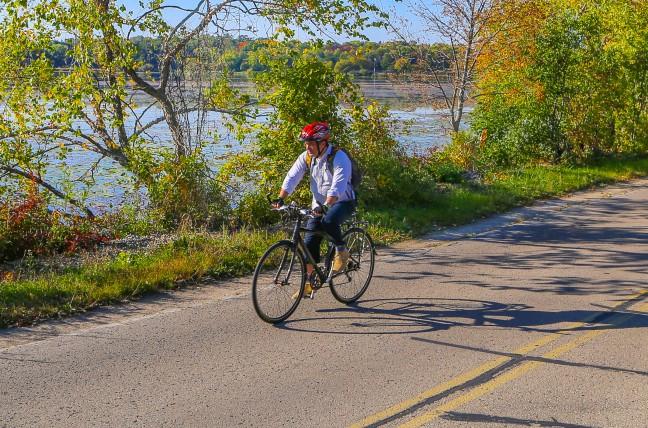A new local bicycle organization is working to provide an outlet for individuals to speak out when it comes to bicycle-related issues and city improvements.
Madison Bikes was founded as a nonprofit in May with the hope of making more people comfortable bicycling around the city, Grant Foster, Madison Bikes president said.
He said the group was created for people who bike around Madison and noticed opportunities for improvement in the city’s bike infrastructure. Many of those people felt like there was not a good way to organize and work towards fixing the problems that they saw.
“We decided to come together and create a space for that to happen,” Foster said. “Our vision is for a city where anyone can ride to and from any place in the city comfortably.”
Foster said there are various areas around the city they want to improve including Monroe Street due to the lack of space for cyclists. The group held its kickoff meeting at the end of September where they collected donations designed to go toward improving bicycling.
Currently there are two plans that could help improve bicycle infrastructure around Madison and the University of Wisconsin campus: Madison in Motion and UW’s 2015 Master Plan.
Madison in Motion is a the city’s sustainable transportation master plan that will guide future transportation-related decisions in Madison.
Foster said he has looked at the plan in depth and shared his thoughts with the project’s manager.
The city of Madison was named a Platinum Bicycle Friendly Community in fall 2015. According to the Madison in Motion plan, bicycling represents 6 percent of the travel mode in the city.
The plan found there are 46 miles of dedicated bicycle paths, 112 miles of bicycle lanes and 116 miles of signed bicycle routes, but there are still multiple gaps in the bicycle infrastructure.
There were some recommendations Foster said he agreed with, but he still thinks there is a lot of work that needs to be done on the plan before it gets finalized. He said there are not any real clear goals or objectives within the plan.
As a way to improve the UW’s campus bicycling infrastructure, the 2015 Campus Master Plan includes changes to make bicycling safer for students.
Aaron Williams, assistant campus planner and zoning coordinator at UW Facilities Planning and Management, said the master plan addresses some of the bicycling concerns on campus.
Some of the changes would be to combine bike lanes into a separated two-way lane on University Avenue and have the Campus Drive bike path connect to Babcock Drive along the redeveloped Willow Creek to the Temin Lakeshore Path. He said there also might be more bicycle stations installed on campus.
“A lot of people are embracing this biking phenomenon,” Williams said. “We’re looking at other ways of illustrating that system, making it more enjoyable, more comfortable for those users,”
Williams said 50 percent of faculty, staff and students get to campus every day with some other form of transportation other than a vehicle.
There are many safety concerns for those biking around campus including railroad tracks and the quantity of new bicyclists, Williams said.
Williams said it can be challenging for students to understand how to safely bike around Madison, especially for the newer students.
“Every year, we get a new influx of students, who come from all walks of life and biking might not be a primary way of getting around,” Williams said.
Madison Bikes hopes to build out a network in Madison that will make cyclists feel more comfortable riding bicycles on the same roads as cars, Foster said. Many people are interesting in riding, but nervous to intermingling with cars.
Foster said Madison Bikes is going to work to help people in the community advocate for a safer bicycling community. He said they plan on being an organization that helps share information and encourage community involvement.
“We don’t really envision Madison Bikes being the one that brings change on its own, more so a catalyst,” Foster said. “It really takes individual citizens to speak up, to share their input at city meetings.”


